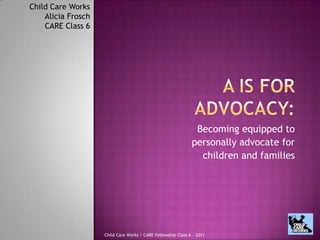A is for advocacy
- 1. A is for Advocacy:Becoming equipped to personally advocate for children and familiesChild Care WorksAlicia Frosch CARE Class 6Child Care Works / CARE Fellowship Class 6 - 2011
- 2. Basics of AdvocacyIs about influencing people, policies, structures and systems in order to bring about change.
- 3. It is about influencing those in power to act
- 4. It can be done by directly by those affected by injustice or on their behalf (or both)
- 5. ANYONE can undertake advocacy work
- 6. Could include many activities: lobbying, mobilization, education, research and networking.Child Care Works / CARE Fellowship Class 6 - 2011
- 7. What is Advocacy? To advocate for someone; to speak on their behalfFighting for someone elseŌĆÖs rights; sticking up for themEveryone has done this in their life! Child Care Works / CARE Fellowship Class 6 - 2011
- 8. In order to be an advocateŌĆ”you must have 2 things!A passionate desire and willingness to see the desired change!A sound understanding of the issue!Child Care Works / CARE Fellowship Class 6 - 2011
- 9. Benefits of advocacyThe aim of advocacy is often the same as for other development work: to alleviate poverty and suffering, fight oppression, challenge injustice or support long-term sustainable development. However, development work is often not enough, because it DOES NOT tackle the root or deeper cause of the problem.Child Care Works / CARE Fellowship Class 6 - 2011
- 10. Benefits of advocacy, contŌĆ”Advocacy is therefore needed as it:Tackles root causes of poverty and injustice and brings long-term changeSees people as agents of change in their own community Can help to generate more resources for other development work Can change power structures and systems of injustice. Child Care Works / CARE Fellowship Class 6 - 2011
- 11. Types of AdvocacyProfessional Advocacy (lobbyist, hired staff person for an advocacy organization) Organizational Advocacy (working in collaboration with an advocacy organization)Personal Advocacy (personal communication, relationship building, educating others)Child Care Works / CARE Fellowship Class 6 - 2011
- 12. How do we already ŌĆ£advocateŌĆØ?NeighborhoodColleaguesOther school communitiesProfessional organizationsFaith organizations Where else?Child Care Works / CARE Fellowship Class 6 - 2011
- 13. Why now? Why me?Do I have to be ŌĆ£political?ŌĆØI am concerned for children . . .I want to grow as a professional in my field . . .I want more meaning to my work . . .Child Care Works / CARE Fellowship Class 6 - 2011
- 14. Examples of PoliticiansŌĆÖ Impact on Your Daily LifeYour work safety: overseen by OSHA, which is directed by a PresidentialappointeeWhen you turn on the lights: rates of electricity are approved by the Public Service Commission, appointed by the GovernorIf youŌĆÖre laid off: unemployment compensation is set by the State LegislatureThe mattress you sleep on: regulated by the Federal Bureau of Standards, which is controlled by CongressWe elect the people making these decisions!Child Care Works / CARE Fellowship Class 6 - 2011
- 15. Importance of AdvocacyExamples: The importance of advocacy was clear in the 2003 budget cuts ŌĆō more advocacy was neededSeniors: good example of an organized group; even in the budget-cutting year of 2003 senior programs were mostly protected; a direct impact of seniors being organized with strong relationships with their legislators Advocacy played a significant role in avoiding health cuts in 2005 (ex. Saving MnCARE) Advocacy was responsible for winning an increase to the stateŌĆÖs minimum wage in 2005 In 2006 & 2007 child care outcomes improved with increased advocacy effortsChild Care Works / CARE Fellowship Class 6 - 2011
- 16. Advocacy requires:Simply caring; stepping forward to take actionGetting involved with the processBe informed about the issuesBuild a relationship with policymakers; become a resource to themProvide them with informationHold legislators accountableChild Care Works / CARE Fellowship Class 6 - 2011
- 17. Children depend on your advocacyObviously, children canŌĆÖt voteChildrenŌĆÖs lives are impacted every day by policies we adults put into placeChildren need a voice in the processChildrenŌĆÖs needs are immediate; they only have one childhoodChild Care Works / CARE Fellowship Class 6 - 2011












